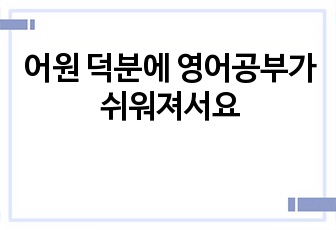소개글
hyperbolic discounting(가치폄하효과)의 개념을 설명하고 diet와 금연과의 관계에 대해서 분석, 설명한 레포트
목차
1. motivation
2. definition
3. background and history
4. hyperbolic discounting and diet failure
5. reference
본문내용
Ⅰ. Motivation
Every new years day, many people are used to making a New Year's Resolution such as, diet and quit smoking. It means that a lot of people eager to diet and quit smoking, however, many people do not succeed in every year. This is why I want to study this reason in the economic point of view-especially, Hyperboric discounting.
Ⅱ. Definition
Hyperbolic discounting refers to the tendency for people to increasingly choose a smaller-sooner reward over a larger-later reward as the delay occurs sooner rather than later in time. When offered a larger reward in exchange for waiting a set amount of time, people act less impulsively (i.e., choose to wait) as the rewards happen further in the future. Put another way, people avoid waiting more as the wait nears the present time. Hyperbolic discounting has been applied to a wide range of phenomena. These include lapses in willpower, health outcomes, consumption choices over time, and personal finance decisions.
참고 자료
Ainslie, George W. (1975) “SpeciousReward: ABehavioral Theory of Impulsiveness and Impulsive Control.” Psychological Bulletin, 82, 463-96.
Ainslie, George W. (1986) “Beyond Macroeconomics, Conflict Among Interests in a Multiple Self as a Determinant of Value. ” in ,Jon Elster, cd.,
The Multiple Self, Cambridge: Cambridge University Press, 133-175.
Ainslie, George W. (1992) Picoeconomics, Cambridge: Cambridge University Press.
Aiyagari, S. Rae. (1995) “Optimal Capital Income Taxation with Incomplete Markets, Borrowing Constraints, and Constant Discounting,”
Journal of Political Economy, 103 (6), pp. 1158-1175.
Bernheim, B, Douglas. (1994) “Do Households Appreciate their Financial Vulnerabilites? An Analysis of Actions, Perceptions, and Public Policy.” Mimeo, Princeton University.
Carroll, Christopher D. and Lawrence H. Summers. (1991) “Consumption Growth Parallels Income Growth: Some New Evidence)” in B. Douglas Bernheim and John B. Shoven eds., National Saving and Economic Performance, Chicago: Chicago University Press for NBER, 1991, 305
Frederick, S., Loewenstein, G. & O’Donoghue, T. (2002). Time Discounting and Time
Preference: A Critical Review. Journal of Economic Literature, 40(2), 351-401.




